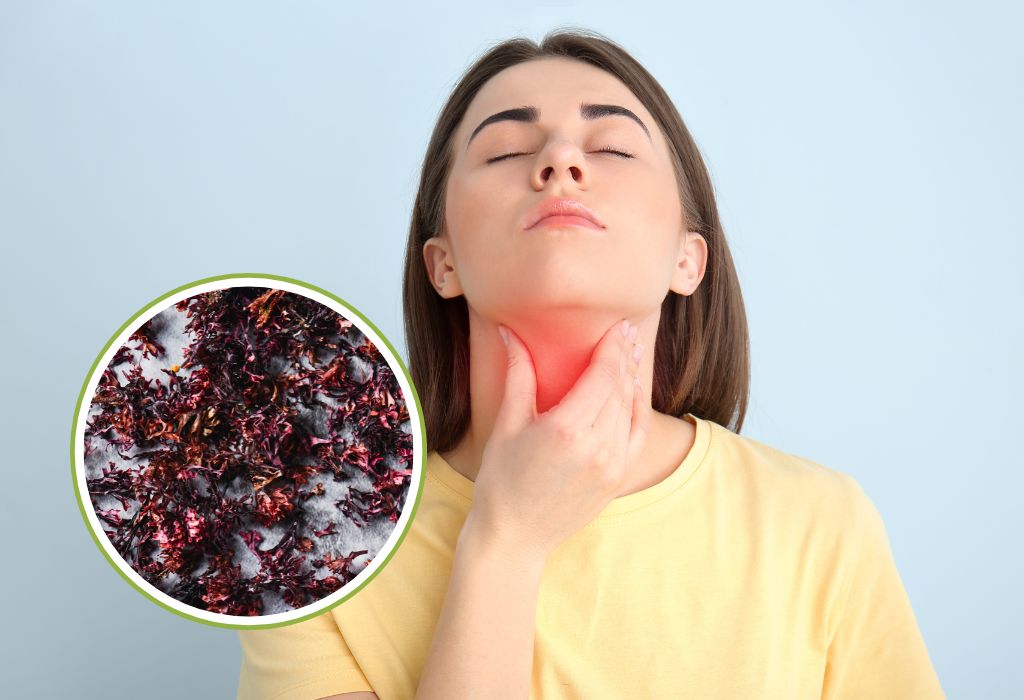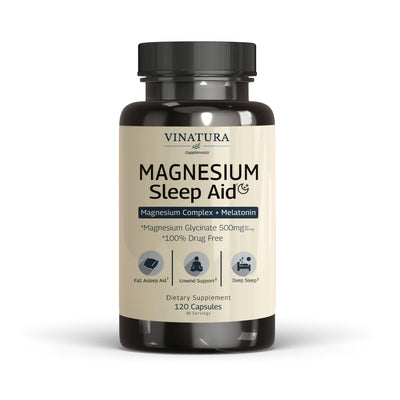
Is Sea Moss Good For Thyroid? How To Use It For Thyroid
Sea moss, also known as Irish sea moss, is a red algae rich in essential nutrients and minerals. This plant is increasingly popular due to its potential benefits, including its effects on the thyroid. This article delves into the benefits of Irish sea moss for the thyroid, how to use it effectively, and FAQs about this plant.
Before exploring further, please read the disclaimer located at the end of this webpage.
Key Takeaways
- Sea moss contains iodine, a necessary substance for thyroid function.
- It can support thyroid health, especially in cases of hypothyroidism.
- Excessive consumption can pose risks, particularly for those with hyperthyroidism.
- Consult a healthcare professional before adding sea moss to your diet, especially if you have thyroid issues.
Is Sea Moss Good For Thyroid?

Sea moss essentially contains specific components that can benefit the thyroid. Some of the thyroid benefits of sea moss include:
- Irish sea moss provides an exceptionally high amount of iodine, an essential ingredient the thyroid needs to produce hormones like triiodothyronine (T3) and thyroxine (T4). [1] These hormones are vital in regulating the body and cardiovascular health, particularly for pregnant women.
- Additionally, sea moss contains various essential vitamins and minerals such as magnesium, potassium, calcium, selenium, and, notably, vitamin D. [2] These substances support the thyroid and overall health, helping prevent health issues, including hypothyroidism symptoms.
What Is Thyroid Gland?
The thyroid gland is an important human organ shaped like a butterfly and located in the neck. It functions to produce essential hormones that impact energy metabolism and overall body development. Therefore, maintaining a healthy thyroid is crucial for a healthy life.
What Are The Common Thyroid Disorders?
As a highly active organ, the thyroid is prone to many issues if not properly cared for. Some common problems include:
- Hypothyroidism
- Hyperthyroidism
- Hashimoto's/Graves: some autoimmune conditions leading to hypo/hyperthyroidism
- Thyroid nodules
- Goiter
- Thyroid cancer
These conditions affect thyroid efficiency, causing abnormal functioning and potentially leading to other discomforting symptoms like swollen neck glands and bulging eyes.
How Does Sea Moss Help the Thyroid?

As mentioned earlier, Sea Moss contains beneficial nutrients and minerals that can positively impact the thyroid. Firstly, its direct mechanism of action:
- Sea Moss provides iodine - a crucial mineral considered as energy for the thyroid to function normally, particularly for those with a weakened thyroid.
- Sea Moss indirectly affects thyroid health by supplying nutrients to boost immunity and support other body organs in functioning effectively, reducing the burden on the thyroid.
What Are The Benefits Of Sea Moss For Thyroid Gland?
Sea Moss for Hypothyroidism
Sea moss can provide the iodine to support thyroid hormone production for those with hypothyroidism. It can help reduce symptoms such as fatigue, uncontrolled weight gain, and depression caused by hormone imbalances in the body.
Is Sea Moss Good For Hyperthyroidism?
While iodine is essential for thyroid function, excessive consumption can exacerbate hyperthyroidism symptoms. Hence, individuals with hyperthyroidism should be cautious when consuming sea moss and seek professional advice.
Is Sea Moss Bad for Thyroid?
The answer to this question is potentially, but only partially. Specifically, iodine supplementation from sea moss is necessary and beneficial for conditions like iodine deficiency or reduced thyroid function. However, for those with hyperthyroidism and excess iodine, supplementation can cause unsafe disruptions.
How to Use Sea Moss for Thyroid Safely

Using sea moss for thyroid health is relatively simple if you follow these principles:
- Consult a healthcare professional before use
- Start with a small and safe dosage to adjust easily
- Choose reputable product sources; even if you use supplements extracted from sea moss, ensure it is sourced from clean, non-polluted waters
- Combine sea moss with a reasonable diet and exercise regimen to enhance health.
Frequently Asked Questions
Can Sea Moss Help With Hashimoto's Disease?
Sea moss can support thyroid function in Hashimoto's disease due to its iodine content. However, autoimmune conditions need careful management, and professional medical advice is necessary before using any related products.
Is Sea Moss Good For Hyperthyroidism?
Individuals with hyperthyroidism should be cautious with sea moss due to its high iodine content, which can worsen the condition.
Can Sea Moss Help With Thyroid Nodules?
No specific scientific evidence exists to prove this, so further research is needed before claiming that sea moss can help with thyroid nodules.
Does Sea Moss Cause Thyroid Cancer?
There is no evidence that sea moss causes thyroid cancer. However, excessive iodine consumption can affect thyroid health, which is a recurring caution for those with thyroid issues.
Is Sea Moss Good For Grave Disease?
There is no specific research on this; however, the high iodine content may not benefit those with Grave's disease - an autoimmune thyroid condition.
Is Sea Moss Good For Underactive Thyroid?
Indeed, if hypothyroidism symptoms stem from iodine deficiency, sea moss can help regulate and balance it.
Does Sea Moss Interfere With Thyroid Medication?
Sea moss can interact with certain medications due to its nutrient content. Therefore, consulting a specialist is necessary if you are on any medication.
Conclusion
Due to its rich iodine content, sea moss can be a beneficial addition to your diet to support thyroid health, especially for those with hypothyroidism. However, safe and moderate use is essential. Always consult a healthcare professional before adding sea moss to your diet, especially if you have thyroid issues.
References
- [1] Smyth PPA. Iodine, Seaweed, and the Thyroid. Eur Thyroid J. 2021 Apr;10(2):101-108. doi: 10.1159/000512971. Epub 2021 Jan 27. PMID: 33981614; PMCID: PMC8077470. https://www.ncbi.nlm.nih.gov/pmc/articles/PMC8077470/
- [2] Calello DP, Jefri M, Yu M, Zarraga J, Bergamo D, Hamilton R. Notes from the Field: Vitamin D–Deficient Rickets and Severe Hypocalcemia in Infants Fed Homemade Alkaline Diet Formula — Three States, August 2020–February 2021. MMWR Morb Mortal Wkly Rep 2021;70:1124–1125. DOI: http://dx.doi.org/10.15585/mmwr.mm7033a4.
Author

Product Disclaimer
Including an ingredient or study does not evaluate, endorse, or recommend any Vinatura product or any third-party product. Some ingredients discussed may not be used in any Vinatura product.
The content of the articles has not been evaluated by the Food and Drug Administration (FDA) and is not intended to promote or endorse any specific product. Any products sold on this website are not intended to diagnose, treat, cure, or prevent any disease.
Opinions and Endorsements
Any claims, statements, or opinions expressed in the articles are those of the author(s) and do not necessarily reflect the views or opinions of the manufacturers of the dietary supplement products. The products sold on this website are separate from the content of the articles and are not directly endorsed or associated with the information presented here.
Liability Disclaimer
The author(s) of the articles, website, and manufacturers of the dietary supplement products do not assume any liability for any potential consequences arising from the use of the information provided in the articles. Ingredient effects, dosages, and safety vary by individual, formulation, and context; some ingredients interact with medications or may be unsuitable during pregnancy or lactation. It is recommended that individuals consult with a qualified healthcare professional before making any dietary or lifestyle changes, including the use of dietary supplements.
Product Usage
Please refer to the product labels and packaging for specific usage instructions and guidelines for the dietary supplement products sold on this website.
Customer Support
For any concerns or questions regarding the dietary supplement products, please contact our customer support team, who will be more than happy to assist you.





Leave a Comment
Be the first to comment.
What do you think?